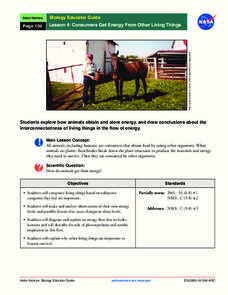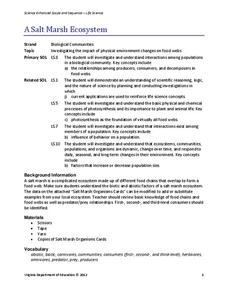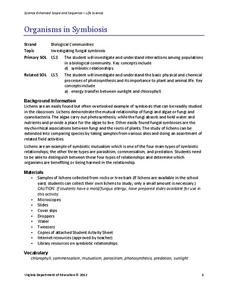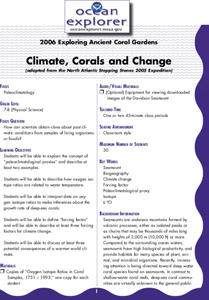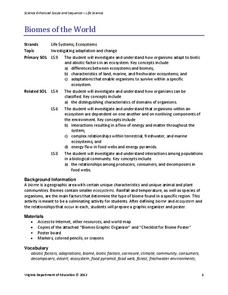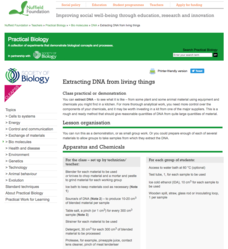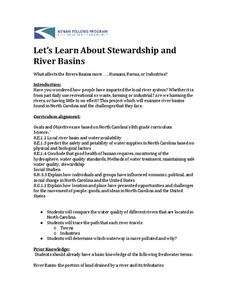Tech Museum of Innovation
Seed Dispersal
Engineering challenges are not just man-made ... nature has its own set of them. A hands-on STEM activity has groups designing a seed dispersal system. Each group can only use one sheet of paper — a tough task!
Illinois Department of Natural Resources
Section One: What is Biodiversity?
Four intriguing and scientific activities invite learners to explore the natural resources of their town. The activities cover concepts such as genetic traits, organizing species in a taxonomy, the differences between different species...
Curated OER
WET Science Lesson #3: Comparison of Aquatic and Terrestrial Plants
Elementary life science explorers compare and contrast aquatic and terrestrial plants (elodea and soybeans) in a Venn diagram. Some background information is provided to support direct instruction, and general instructions are provided...
Virginia Department of Education
The Cell Cycle and Mitosis
What a packed lesson plan! Provide your class with the opportunity to learn about the cell cycle in several exciting ways. Biologists first learn about the theory behind mitosis, then proceed to view onion tips under the microscope and...
Curated OER
Speedy Succession
Fifth graders identify how a pond can change into a grassland. An ecosystems lesson where learners identify pioneer and climax species, and recognize that ecological succession can take up to 100 years or more. Some excellent activities...
Curated OER
Peregrine Falcon
Young environmentalists study the effects that pesticides have on birds, such as the peregrine falcon. They also look at predator/prey interactions. Some wonderful in-class activities accompany an inventive instructional activity. After...
National Wildlife Federation
Citizen Science to the Rescue!
You don't have to be a scientist or even out of high school to contribute to scientific research. In the 12th lesson in the series of 21, scholars use this opportunity to add to the growing body of scientific knowledge and consider the...
NASA
Consumers Get Energy From Other Living Things
How do plants and animals get their food? Learn about where energy comes from, how animals store energy, and aerobic respiration, in a lesson that allows scholars to diagram energy flows.
Curated OER
Edible GMOs?
The debate over genetically modified organisms is on! Young biologists imagine that they have been asked to choose which corn chips will be sold for a fundraiser, one made with GMOs or one without. This four-day lesson plan requires...
Nuffield Foundation
Microbes Ate My Homework
Now you have a new excuse not to do your homework. A long-term experiment has learners explore cellulose-digesting enzymes. They simulate how paper breaks down in a compost bin. There's no need to blame your dog for eating your homework...
Curated OER
Understanding and Using Root Words to Expand Vocabulary
Middle schoolers engage in a lesson which reminds them that root words indicate the base meaning of a word, and that those roots are found in many different words that have similar meanings. Pairs of pupils use construction paper and...
Calvin Crest Outdoor School
Survival
Equip young campers with important survival knowledge with a set of engaging lessons. Teammates work together to complete three outdoor activities, which include building a shelter, starting a campfire, and finding directions in the...
Montana Natural History Center
Studying Grassland Ecosystems
At first glance, grassland ecosystems might seem dull and uninteresting, but once you start to explore it's amazing the things you'll find! Through this series of engaging lessons, activities, and experiments, elementary students examine...
Curated OER
WET Science Lesson #5: Pass the Salt Please! (How Road Salt Affects Wetlands)
As an anticipatory set, biologists listen to the story of Ruth Patrick, a scientist who used algae to detect water quality. They observe a demonstration of osmosis and diffusion. In their lab groups, they place Elodea stalks in...
Salt River Project
How Do We Clean Polluted Water?
How do we clean up oil spills and other pollutants in the water? Explore water treatment strategies with a set of environmental science experiments. Groups remove oil from water, work with wastewater treatment, and perform a water...
NOAA
A Matter of Density
Larvae transportation on the New England seamounts is based on the density of the water. Scholars calculate density and graph salinity versus temperature to better understand the distribution of organisms in a water column. Discussions...
Virginia Department of Education
A Salt Marsh Ecosystem
What a web we weave. Pupils use yarn as the primary resource to create a web depicting the intricacies of a salt marsh ecosystem. They participate in a question and answer session, which leads to an in-depth facilitated discussion about...
Virginia Department of Education
Organisms in Symbiosis
Searching for an activity that allows emerging biologists to explore symbiosis up close and personal? Pupils collect samples and view lichens through a microscope and conclude with a discussion about the relationship they have with other...
NOAA
Climate, Corals and Change
Global warming isn't just an issue on land; deep ocean waters are also showing troubling signs. Young scientists learn more about deep water corals and the many recent discoveries researchers have made. Then they examine data related to...
NOAA
It's a Roughy Life
Scientists recently discovered several previously unknown species at the Bear Seamount off the coast of New England. Scholars research these new species — benthopelagic, benthic, and seamount fish — and find out what makes them unique....
Virginia Department of Education
Go with the Flow
How does nature's hierarchy relate to our local human environment? Answer this question, along with others, as the class visually depicts the natural hierarchy provided by nature. Pupils discuss each piece of the pyramid and its energy...
Virginia Department of Education
Biomes of the World
Incorporate knowledge about biomes and ecosystems in multiple ways while encouraging creativity. Emerging ecologists collaborate and perform research to complete a graphic organizer about various biomes of the world. They conclude the...
Nuffield Foundation
Extracting DNA from Living Things
Help! Someone's trying to take my DNA! An interesting lab experiment has scholars use basic materials to extract DNA. By applying ethanol, cold water, and a protease enzyme, like pineapple juice, they pull strands of DNA from peas,...
Kenan Fellows
Let's Learn About Stewardship and River Basins
What does it mean to be a good steward? Middle school environmentalists learn to care for their state's waterways through research, a guest speaker, and poster activity. Groups must locate and learn more about a river basin and the human...
Other popular searches
- Plant Biology Photosynthesis
- Grade 11 Plant Biology
- Plant Biology Projects
- Plant Biology Leave
- Plant Biology Flowers
- Plant Biology Vocabulary
- Plant Biology Unit Plans
- Plant Biology Healthy Plants
- Plant Biology Powerpoint's
- Plant Biology Seeds
- Plant Biology Powerpoints
- Plant Biology Regeneration









